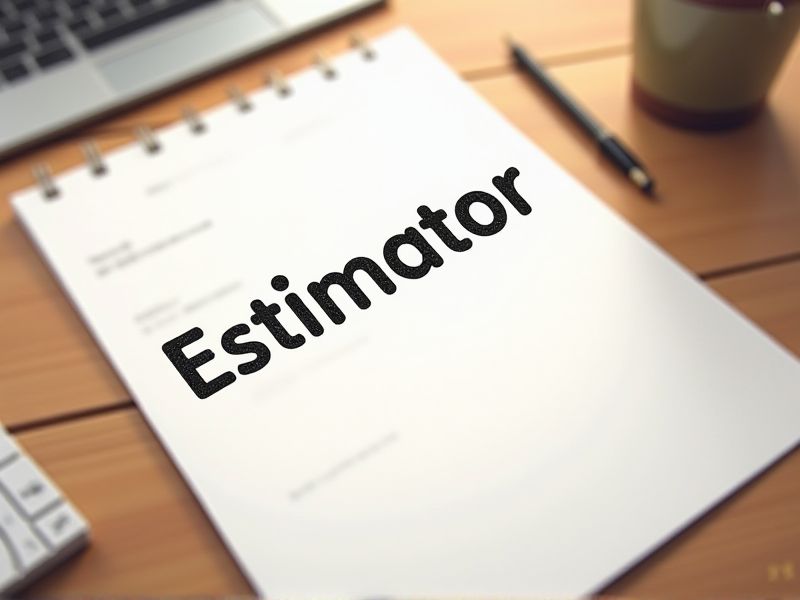
Estimators play a crucial role in project management, ensuring accurate cost projections that influence budget decisions. Certifications equip estimators with advanced skills in analytics, risk assessment, and precision, directly impacting project profitability and feasibility. Accredited certifications also establish a standardized body of knowledge and credibility, fostering client trust and competitive advantage in the industry. Here are some important certifications you might require as an estimator.
Certified Professional Estimator (CPE)
Having a Certified Professional Estimator (CPE) credential enhances an estimator's credibility, instilling confidence in clients and stakeholders. The CPE designation reflects a comprehensive understanding of industry standards and best practices, ensuring accurate project cost predictions. Certified estimators demonstrate a commitment to ongoing professional development, staying updated with evolving materials, techniques, and regulations. Employers tend to favor certified professionals for their consistent ability to deliver precise estimations, reducing potential financial risks.
Certified Construction Estimator (CCE)
The role of a Certified Construction Estimator ensures accuracy in cost assessments, which directly impacts budget management in construction projects. By possessing a CCE, estimators demonstrate a high level of knowledge and skill, which fosters trust among clients and stakeholders. A CCE is equipped to use standardized practices, thereby reducing the likelihood of significant financial overruns. Having a certified professional helps streamline project management, leading to increased efficiency and successful project outcomes.
Certified Cost Estimator/Analyst (CCEA)
Having a Certified Cost Estimator/Analyst (CCEA) enhances the credibility and reliability of cost estimates by adhering to nationally recognized standards. A CCEA brings a structured methodology to estimation, which minimizes errors and increases accuracy in financial forecasts. This certification ensures that estimators are up-to-date with industry trends and best practices, leading to more informed decision-making. Stakeholders often trust cost assessments more when performed by certified professionals, mitigating risks associated with budget overruns.
RSMeans Estimating Specialist Certification
The RSMeans Estimating Specialist Certification equips estimators with a standardized approach to cost estimation, ensuring accuracy and reliability in project budgeting. The certification validates an estimator's proficiency in using RSMeans data, a widely recognized standard in the construction industry, which can enhance credibility and reputation. Employers may prefer certified estimators due to their demonstrated expertise, potentially leading to more job opportunities and career advancement. Gaining this certification can also contribute to improved efficiency and reduced errors in project cost evaluations, supporting better project management outcomes.
American Society of Professional Estimators (ASPE) Accreditation
The American Society of Professional Estimators (ASPE) Accreditation provides standardization, ensuring estimators follow consistent methodologies for more accurate cost analysis. Estimators with ASPE accreditation demonstrate verified expertise, increasing trust among clients and stakeholders in high-stakes projects. The accreditation process keeps professionals updated with current industry practices, reducing errors and enhancing cost management efficiency. Employers often prefer or require ASPE-accredited estimators, as it signals a commitment to professional growth and adherence to industry standards.
Construction Estimating Certificate Program
Certified construction estimators often secure better job opportunities and command higher salaries. The Construction Estimating Certificate Program equips professionals with essential skills to produce accurate project cost forecasts. Miscalculations in estimates commonly lead to budget overruns and project delays. Industry-recognized certification distinguishes estimators in a competitive job market.
Certified Estimating Technician (CET)
Certified Estimating Technicians (CET) possess a standardized verification of skills that enhances accuracy in project cost projections. This certification helps bridge gaps in knowledge, reducing costly errors in construction and engineering projects. Employers often prefer CETs as they demonstrate a commitment to professional development and industry standards. Having CET-certified estimators boosts organizational reputation by ensuring adherence to best practices in estimation processes.
Building Information Modeling (BIM) Certification
Building Information Modeling (BIM) Certification equips estimators with the skills to accurately interpret and manipulate digital models, resulting in more precise cost estimates. Mastery in BIM ensures efficient data sharing and collaboration across multiple project stakeholders, reducing the likelihood of errors and rework. Access to advanced analytical tools through BIM certification allows estimators to better forecast potential project outcomes and financial impacts. The construction industry increasingly values BIM proficiency, making such certification a vital component for career advancement and industry competitiveness for estimators.
Project Management Professional (PMP)
Having a PMP certification equips an estimator with structured project management skills, improving the accuracy of cost projections. Knowledge of risk management through PMP training helps an estimator anticipate potential project challenges, minimizing unexpected costs. Familiarity with project scheduling and resource allocation allows an estimator to deliver more realistic timelines and budget estimates. Enhanced communication and leadership skills acquired through a PMP certification enable the estimator to effectively collaborate with stakeholders and project teams.
Lean Six Sigma Green Belt Certification
Lean Six Sigma Green Belt certification equips estimators with tools to identify and eliminate waste, which can lead to more accurate project cost assessments. By understanding process variability and defects, estimators can provide more reliable estimates, minimizing the risk of budget overruns. The certification enhances the ability to implement efficient workflows, improving the overall quality of project proposals. Trained estimators can apply data-driven decision-making, increasing stakeholder confidence in project proposals.
Summary
When you earn certifications as an estimator, your credibility with clients and employers typically increases. This enhanced trust often leads to more job opportunities and potentially higher salary offers. Certified skills may result in more accurate and efficient estimations, thereby reducing project risks. These improvements generally boost the overall success and reputation of the projects you handle.
